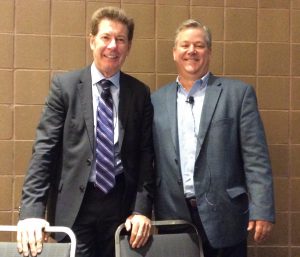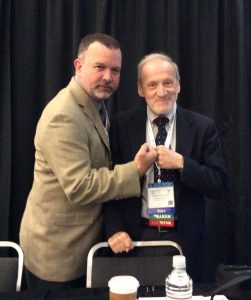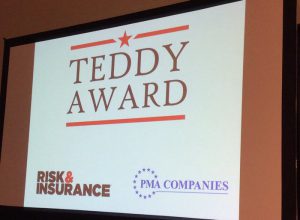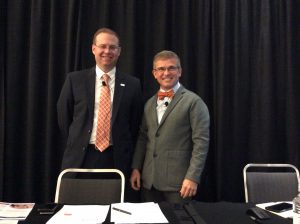PARMA 2016 Annual Conference
Conference Chronicles will be blogging from the PARMA Annual Conference held February 12-15, 2017, in Anaheim, CA. The Public Agency Risk Managers Association (PARMA) was the first organization of its kind – formed to provide a forum for California public sector risk managers to share ideas on how to perform their duties in this emerging field. Today it has grown to an organization that spans the entire state of California, with members in Washington, Oregon, Colorado and Nevada, and is now comprised of over 600 members in six local chapters. Learn more here.
Incorporating Telemedicine into Workers’ Compensation Care
Telemedicine is a hot topic with lots of discussion around its potential to favorably impact workers’ compensation by improving medical care access, but to what extent is it actually feasible today? This session at the 2016 National Workers’ Compensation & Disability Conference featured viewpoints from an employer, vendor and carrier. Speakers included: Ann Schnure, VP Risk Management – Claims, Macy’s Jill Allen, President & CEO, Consumer Health Connections Paul Morizzo, Provider Networks Manager, Missouri Employers Mutual Telemedicine is the next generation of managing injured workers’ medical care and claims. In fact, the telehealth industry is predicted to grow to $34
(Read the full article…)
Telephonic Case Management
At the 2016 National Workers’ Compensation and Disability Conference, David Jones from Express Scripts, Inc., and Peter Greaney from WorkCare, Inc., presented a case study in how Express Scripts used telephonic case management to improve their claims results. Express Scripts is a pharmacy benefit management service that is one of the largest dispensers of medications in the nation. Their headquarters features a state-of-the-art distribution center where all their mail-order prescriptions are filled. They have 120 locations in 35 states around the United States. A couple years ago, Express Scripts merged with their largest competitor, which more than doubled their workers’
(Read the full article…)
Important Elements of Successful Return-to-Work Programs
Return-to-work programs frequently get cited as essential claims management tools for helping injured workers recover while eliminating employer costs. Yet many employers have not implemented programs, perhaps fearing that the task is too daunting. This session at the 2016 National Workers’ Compensation & Disability Conference offered strategies to create a return-to-work program. Speakers included: Ann-Marie Amiel, Risk Manager, Columbus Consolidated Government Patricia Biegler, Director of Public Works, Columbus Consolidated Government Return-to-work programs can help reduce injured worker absences, reduce costs and improve employee morale. There are several elements to include in any successful return-to-work program. Internal Strategy: Create an accident-review
(Read the full article…)
Causation Standards and Medical Experts
At the 2016 National Workers’ Compensation & Disability Conference, Stuart Colburn from Downs Stanford P.C and Jacob Lazarovic, M.D., from Broadspire explained causation standards that can assist in defending soft tissue claims. Causation standards vary significantly by jurisdiction. The exact same argument in two different states can result in two different results based on how judges in that state interprete the information. An important element of any causation argument is evidence-based medical guidelines. It is important to focus on these industry-accepted standards, which can be applied regardless of the jurisdiction. NIOSH standards for determining causation: Is the disease present? What
(Read the full article…)
Sorting Out Pain Management Guidelines
Medical treatment guidelines can improve worker health by helping doctors and nurses deliver proper care. Multiple pain guidelines exist and, as their use grows, there is a greater need for claims managers to learn how they are best applied. This session at the 2016 National Workers’ Compensation & Disability Conference illustrated the purpose of chronic pain management guidelines and showed how they are used. Speakers included: Joseph Paduda, Principal, Health Strategy Associates & author of the Managed Care Matters Blog Steven D. Feinberg, M.D., Pain Management Physician, Feinberg Medical Group Guidelines Overview About 100,000 people die a year due to
(Read the full article…)
Teddy Award-Winning Employers Showcase Their Successful Strategies
This roundtable session at the 2016 National Workers’ Compensation & Disability Conference provided key strategies and tangible practices from this year’s Teddy Award Winners. Panelists included: Danielle Hill, Human Resources Compliance Manager, Hampton Roads Transit Jennifer Massey, Corporate Director of Safety and Health and Claims Management, Harder Mechanical Contractors Laurie English, Senior VP, Chief Human Resources Officer, Excela Health Hampton Roads Transit is a public transportation agency that did a complete overhaul of their workers’ compensation and safety programs. Hazards they face include driver accidents, passenger violence and overexertion. Their claims system had been doubling annually with little accountability built
(Read the full article…)
The Advocacy Approach to Workers’ Compensation Claims
At the 2016 National Workers’ Compensation & Disabilty Conference, a panel discussed using an advocacy approach to workers’ compensation claims management. The panel was: Denise Algire – Director Managed Care & Disability Corporate Risk, Albertsons Companies Scott Daniels – Director of Disability, Comcast William Wainscott – Manager Workers’ Compensation & Occupational Health, International Paper Kimberly George – Senior Vice President, Senior Healthcare Advisor, Sedgwick What is Advocacy? Ultimately, advocacy is about taking care of people. As employers, your workforce is your most valuable asset. The advocacy approach to workers’ compensation claims handling focuses on the experience of the consumer, who
(Read the full article…)
Bringing Value-Based Care to Workers’ Compensation
There is an industry consensus that shifting away from fee-for-service payments for medical treatment to value-based care will benefit workers’ compensation by linking medical-provider pay to patient outcomes. In this session at the 2016 National Workers’ Compensation & Disability Conference, early adopters of values-based models explained their strategies, challenges encountered and results obtained. Speakers included: Robert Evans, VP of Repricing Solutions, Rising Medical Solutions Cyndy Larsen, Area VP, Kaiser Permanente Ann Schnure, VP Risk Management – Claims, Macy’s Stephen T. Woods, M.D., Chief Medical Officer, Ohio Bureau of Workers’ Compensation Value-based care rewards high-quality and cost-effective patient care, ties payments
(Read the full article…)
Restoring Function and Returning to Work
At the 2016 National Workers’ Compensation & Disability Conference, Marcos Iglesias from The Hartford and Robert Hall from Helios discussed the impact of disability and tools for improving outcomes for injured workers. Ways injured workers are impacted by disability include: Loss of income – Not only during the course of the claim, but potential loss of income in the future. Passivity – Not taking an active role in your own rehabilitation. Waiting for others to tell you want to do. Loss of self-efficacy – Loss of initiative to do things for yourself. Isolation – Work provides a great deal of
(Read the full article…)











